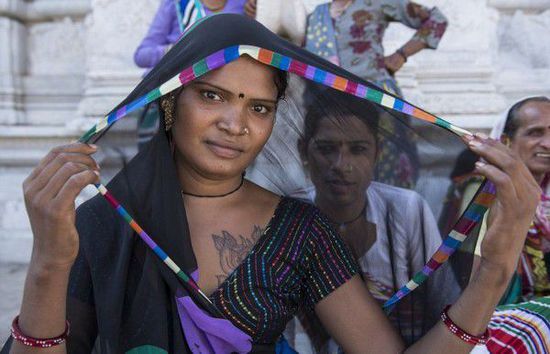Yet hijras, and their counterparts in other Asian societies, remain on society’s margins.
然而,海吉拉斯和其他亞洲國家類似人群都仍處在社會邊緣。
As Anjaann Joshii of SPACE puts it: “You can sing, dance, bless, curse—but that’s it.”
正如SPACE的安佳佳·佐絲所言,你可載歌載舞,也可攜福撒咒,但你也就僅限于此。
The linguistic roots of the word hijra convey a sense of leaving one’s tribe.
從語言學來看,海吉拉斯的詞根流露著一股“離群感”。
Many hijras find life in a new community, usually called a dera, run by a guru-mother.
許多海吉拉斯會組建一個新部落,通常稱作dera,由一位“古魯媽媽”統領。
Yet such protection comes at a cost.
但這種保護并非“免費午餐”。

Three of the five hijras whom Banyan met in Old Delhi had been castrated.
Banyan曾在舊德里拜訪過五位海吉拉斯,其中三位已接受閹割。
In modern practice, the surgical element of a sex change takes place at the very end of a careful process of counselling, hormone therapy and plastic surgery.
按現代慣例,變性人在接受手術前,都會進行一系列嚴謹的步驟,比如先進行咨詢,后接受荷爾蒙治療,再接受塑形手術。
But for many hijras, surgery would be too grand a term for the removal of the testicles and penis and the insertion of a silver pin into the urethra, with no anaesthetic but alcohol and marijuana.
但對于多數海吉拉斯而言,他們大多連麻醉劑都不會注射,在僅服用酒精或大麻的情況下,就切除睪丸和陰莖,把銀制針管塞進尿道,若將此稱作手術,可謂荒謬。
Worse, many gurus are mafia bosses running rackets in defined territories.
許多古魯是在特定地區行騙的團伙頭目,對海吉拉斯而言,這可謂是雪上加霜。
They pocket four-fifths of hijras’ earnings.
他們吸納了海吉拉斯五分之四的收入。
Any hijra setting up as a guru herself risks murder.
若有海吉拉斯想自立門戶,她可得小心人頭落地了。
And running away to another dera, even if to the far end of the country, will be reported back to the guru.
無論是逃跑到其他dera,還是跑到國家邊境,他們的行蹤依舊逃不出古魯的掌控。
It is, in effect, a system of bonded labour.
實際上,這就是一種包身工制度。
And when you die, say the hijras, your guru won’t even come to claim your corpse—unless there is gold to strip off it.
海吉拉斯說,若你死去,古魯甚至不會認領你的尸首,除非你身上還有錢讓他們搜刮。
There is even less protection for those who sell sex or beg.
那些從事性工作和乞討的變性人就更缺乏保護了。
Mehak, a trans beggar, faces violence in male shelters and is refused entry to female ones, so she sleeps in a park each night.
Mehak是一位變性乞討者,她在男性收容所受盡欺凌,又無法進入女性收容所,所以她只能每夜睡在公園。
Every few days, young thugs steal her paltry takings at knifepoint.
每隔幾天,一些小流氓就用刀威迫她交出其微乎其微的錢財。
Although the courts in some Asian countries are beginning to uphold transgender rights, laws are often confused and enforcement rare.
盡管一些亞洲國家的司法機關開始維護變性人的權利。但相關法律經常含糊不清且甚少得以實施。
In 2014 India’s Supreme Court recognised a third gender, yet the British-era penal code still criminalises sexual activities against the “order of nature”.
印度最高法院在2014年承認了第三性別的合法地位,但其英屬刑法仍將“違反自然規律”的性行為定罪。
The current draft of a bill working its way through Parliament enshrines transgender rights by mandating inclusive education for trans children, and special employment and health provisions.
近期,一份于國會通過的草案將大幅提高變性人的權利,它包括變性兒童的獨特義務教育、特殊雇傭制度和醫療健康保障。
Yet it denies individuals the right to “self-identify” —ie, choose their own gender, a key desire.
但它否定個人“個體身份”的權利,例如變性人最渴望的選擇自身性別。
That would be left to “experts” instead.
換而言之,這就將由“專家”來定斷你的性別了。
Trans activists are lobbying to have that changed.
變性運動分子正在游說政府對此作出改變。
Elsewhere in the region, the law is an ass.
在亞洲其他地區,變性人的相關法律形同虛設。
Several Pacific nations ban cross-dressing (another hand-me-down from prudish Victorians) .
幾個太平洋國家禁止人們穿著異裝(談性色變的維多利亞風俗再現)。
Even in Thailand, supposedly tolerant to cross-dressingmen, vagrancy laws are used to harass transwomen.
人們一般認為泰國會對異裝男士比較包容,但即使在這里,變性女性常因流浪罪受到騷擾。
In Cambodia police conduct regular round-ups of trans women under public-safety laws and demand bribes to let them go.
在柬埔寨,警察經常以公共安全名義圍堵變性女性,要她們上交賄賂才放行。
Many countries still define transsexualism as a mental illness.
許多國家仍將變性定義為一種心理疾病。
Trans people adopting children is illegal in most Asian countries.
在大多數亞洲國家,變性人收養孩子都算違法。
Activist groups like SPACE have made strides in a few short years.
數年來,像SPACE這種變性人運動組織已經竭盡全力維護變性人利益。
But they are baby steps for what needs to come.
但就變性人群體所需而言,這宛如滄海一粟。


